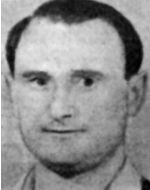Korsonsky, Joseph, Dr.
Son of Zvi was born on October 14, 1914 in Kremenchug, Poltava, Russia. From childhood he had a tendency to music and excelled in playing the violin. When they finished conservatory in Kharkov, his teachers predicted a bright future for him as a musician, but he did not want to make music from his source of income and entered the medical faculty of the Kharkov University where he received a government scholarship. Six years later, when he completed his studies and received a doctor’s certificate for internal diseases, he was awarded a medal. His artistic inclinations found expression not only in music, but also in a Russian poem and story. Even though he was educated on the knees of a foreign culture and despite being cut off from his people, from his culture and homeland, the Holy Fire flashed in his Lev. From his youth he longed to immigrate to Israel and to settle in it, was eager to know the life of his ancient-new homeland and was willing to give her all his Lev and give her his many knowledge. But the iron curtain separated him from his wish. In 1946, when Polish Jews in the Soviet Union were granted permits to return to their country, his father received an exit permit for himself and his son. When they arrived in the city of Linz, Austria, he worked as a doctor for a year and a half, and after a few months in Marseilles, the father and son received certificates of immigration to Israel, and on January 12, 1948 they reached the shores of the homeland. He sought to reach the first sources in order to become acquainted with the loftiest and most Yaffa of his people’s culture, and when he was once invited to Bialik’s poems in Russian translation, he drank them thirstily and said: “A new, rich and varied world suddenly appeared to me. In my poetry, I did not touch Jewish subjects. From now on Bialik will be my guiding light. “I saw what I had been up to now!” He was nice to the sight and very Yaffa, loving himself to others, to the point of self-sacrifice and endless devotion to his father (his best friend, as he would call him.) In the middle of March 1948, On Mount Scopus, on the recommendation of the Central Committee of the Jerusalem Medical Association, and was accepted as an intern in skin diseases, but his new life did not last for days: three months later, on April 13, 1948, In a convoy to Mount Scopus not only to fulfill the mitzvah of visiting the sick, but to demand the peace of his father, who was then ill. The road to Mount Scopus passed through the Arab neighborhood of Sheikh Jarrah and upon the outbreak of the war the movement was allowed to mount convoys secured by the British army. On the morning of 13.4.1948, a convoy left for Mount Scopus, after the British promised that the road was open and safe. The convoy encountered an Arab ambush in the Sheikh Jarrah neighborhood and hundreds of Arabs hurled heavy gunfire at it. Some of the vehicles managed to get out and return, but two buses, an ambulance and a escort vehicle were ambushed. For many hours the convoy members fought and tried to prevent the Arabs from approaching the vehicles. Fire from our positions in the city and Mount Scopus, as well as armored vehicles sent to the area, failed to help the convoy. British military forces in the area did not intervene and did nothing to help, despite appeals to them. In the afternoon the Arabs managed to set fire to two buses on their passengers. Only late in the evening the British intervened and rescued the survivors from the trapped vehicles. Joseph was brought to eternal rest in the Sanhedria cemetery in Jerusalem.
